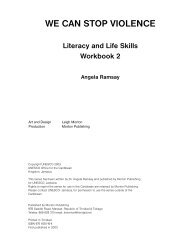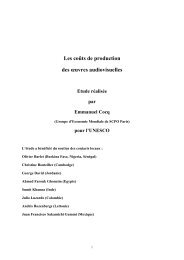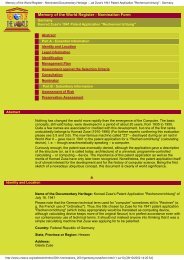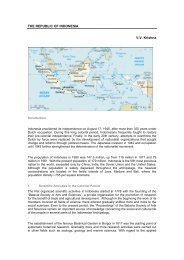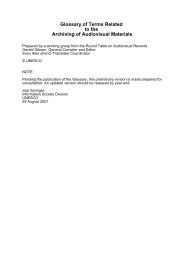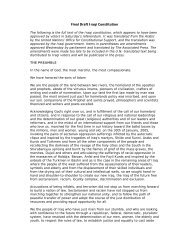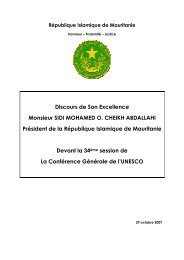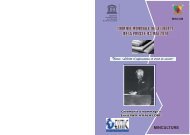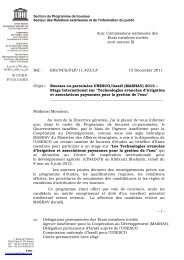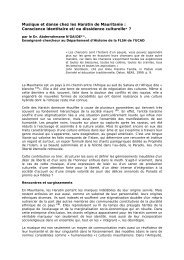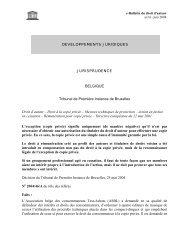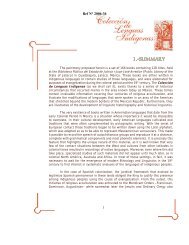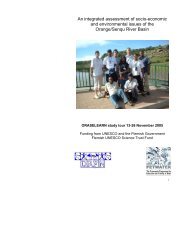Accepted Papers - 3.pdf - UNESCO
Accepted Papers - 3.pdf - UNESCO
Accepted Papers - 3.pdf - UNESCO
Create successful ePaper yourself
Turn your PDF publications into a flip-book with our unique Google optimized e-Paper software.
National Seminar on Rainwater Harvesting and Water Management 11-12 Nov. 2006, Nagpur<br />
79. Rain water harvesting –Public awareness<br />
* Pradeep S. Bhalge<br />
Abstract<br />
Indian ancestors realized that water is very ephemeral resource for them. They<br />
began to love the monsoon season. They realized that human society couldn’t grow without<br />
extending the bounties of monsoon water from the wet months to the dry months. They<br />
slowly grew the extraordinary traditions of rainwater harvesting in myriad form in different<br />
parts of India. Ancestors have given holistic approach to the water. India is the only<br />
country in the world where water is called as “Tirth”. “Tirth” means the holy water. Due<br />
to this concept in mind no body was wasting the available water and dared to add impurities<br />
to the water resources. Unfortunately today, peoples are forgetting the water heritage,<br />
water culture, and the sustainable technology. This results in to impure and scare water.<br />
In the past days the peoples/ community always had an important role in constructing and<br />
managing the traditional water harvesting systems. This was the reason of the prosperity<br />
in the olden days. This paper deals with the public awareness about the traditional rainwater<br />
harvesting techniques, and importance of people’s participation for efficient use of available<br />
water resources.<br />
Introduction<br />
Once upon a time India was known for surplus<br />
production in the field of agriculture. The prosperity<br />
at that time was depends upon the Agricultural<br />
production and the agriculture was depends upon<br />
the wise full management of available water<br />
resources. Indian agriculture is a monsoon feed<br />
agriculture. The monsoon is known for its vagaries.<br />
One cannot predict anything about its quantity,<br />
extent, intensity, and period of stress. Some times<br />
it rains so heavily, at others it does not rain at all.<br />
To overcome these uncertainties the fore fathers<br />
invented various devices of water conservation.<br />
Some of them are still functioning in different parts<br />
of the country, while the others are waiting for<br />
getting restored. Water is prerequisite of life and<br />
there is no substitute for water. Hence the by gone<br />
scientist realized the essence of water. They made<br />
entire society aware of it. They made conservation<br />
and preservation of water the concern of every-body<br />
and hold every body responsible for its misuse. The<br />
wrong done were severely punished. Ancient stories<br />
description and the narrations written by the foreign<br />
visitors describe the prosperity of our nation at that<br />
time. The prosperity was depending upon the wise<br />
full management of water resources. Prosperity was<br />
attended in the period of dynasty like Gupta’s,<br />
Satwahana’s, Morvay’s,Yadava’s, Hinu dynast of<br />
Vijaynagram, and others. In that period we were<br />
far ahead of other nations in agriculture science.<br />
Information about the few glimpses of Traditional<br />
wisdom in water management is given below.<br />
Water as Tirth<br />
India is the only country where water is<br />
honored as ‘Lok Mata’ i.e. folk mother. They are<br />
hence worshiped as goddesses. Water of rivers and<br />
scared hydraulic bodies was given the status of<br />
‘tirtha” i.e. holistic drink. Tirtha has great respect<br />
in the society. On every religious occasion water is<br />
worshiped at the beginning of the ceremony. On<br />
the third day of Vaishkh a ritual of Akshaya Tritiya<br />
is observed though out the country. Rivers like<br />
Ganga, Yamuna, Sindhu, Sarswati, etc. and<br />
hydraulic bodies like lakes and reservoirs, step<br />
wells, and hot water springs were honored<br />
* Assistant Engineer Gr .II, Jayakwadi Project Circle, Aurangabad.<br />
447



